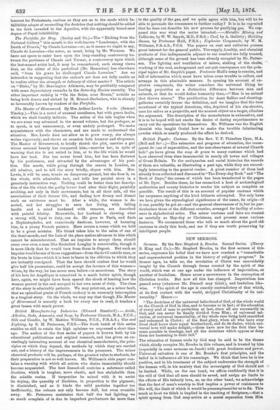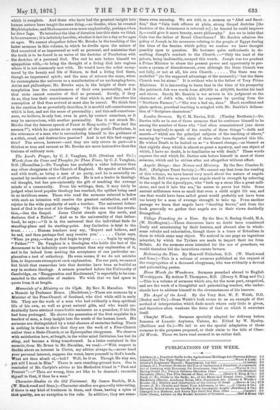NEW SERMONS.
Sermons. By the Rev. Stopford A. Brooke. Second Series. (Henry- S. King and Co.)—Mr. Stopford Brooke, in the first sermon of this, series, expresses his belief that we have n3w reached a "remarkable and unprecedented position in the history of religious progress." In. former ages, he tells us, the revelation of Christ was unavoidably' taught by the Church through forms created by the spirit of the world, which was at one age under the influence of imperialism, at another of feudalism. Hence arose a narrowness in the conception of Christian truths. But now all this has changed. Imperialism has passed away (whatever Mr. Disraeli may think), and feudalism like- wise. " The spirit of the age is exactly contradictory of that which, at its first contact with the world, stripped Christianity of its uni- versality." Hence:— " The doctrines of the universal fatherhood of God, of the whole world as the Church of God in idea, and to become so in fact ; of the education of every soul of man to perfection at last, since all are necessarily in. God, and can never be finally divided from Him ; of universal sal- vation, of universal immortality, of the whole race being held sanctified and redeemed in Christ ; of the final glory, when all who have ever lived shall know their equal brotherhood, and do its duties, which uni- versal love will make delight,—these have now for the first time be- come possible in theology, and all the doctrines which oppose or deny them are hastening to their fall."
The education of human souls by God may be said to be the theme which chiefly occupies Mr. Brooke in this volume, and is treated by him (especially in some sermons on Jacob) with great freshness and power. Univenal salvation is one of Mr. Brooke's first principles, and the belief in it influences all his reasonings. We think that here he is too positive, and in his treatment of the subject underrates the strength of the human will, in his anxiety that the sovereignty of God should trot - be limited. While, on the one band, we affirm confidently that it is. the will of God that all men should be saved, and assign no limits to. the efforts of His fatherly love, Bo. on the other hand, we acknowledge that the fact of man's sonship to God implies a power of resistance to His will, the limit of which it would be presumptuonifor nate fix. This much at least we think is implied in the teaching of Scripture,—that a spirit sprung from God may arrive at a moral separation from Rim which is complete. And those who have had the greatest insight into human nature have taught the same thing,—as Goethe, when he created Mephistopheles ; and Shakespeare even more emphatically, perhaps,when he drew logo. To introduce the idea of duration into this state we think to be erroneous ; it is infinitely horrible, whether it last for a day or for ages on ages. We cannot altogether follow Mr. Brooke in the teaching of the latter sermons in this volume, in which he dwells upon the nature of God conceived of as impersonal as well as personal, and maintains that the truth is to be found in an union of the doctrine of Pantheism with the doctrine of a personal God. The end ho sets before himself we sympathise with,—to bring the thought of a living God into regions where it is not commonly met with. He would have the artist enrap- tured by the beauty and life of Nature, to find a living God there, though an impersonal spirit ; and the man of science the same, when he contemplates the universe as a manifestation of an unchanging force. Artist and philosohper, Mr. Brooke says, in the height of their con- templation lose the consciousness of their own personality, and in that state cannot conceive of God as personal. Surely, if they de so, they lose their consciousness of that which is, and therefore the conception of God thus arrived at must also be unreal. We think that in the emotion he so powerfully describes, it is morbid self-consciousness which is lost, and not the sense of personality ; and this self-conscious- ness, we believe, is only lost, even in part, by contact conscious, or it 'may be unconscious, with another personality. Has it not struck Mr. Brooke that the famous speech of Faust to Marg uerite (" Wer darf ihn nennen ?"), which he quotes as an example of the poetic Pantheism, is the utterance of a man who is surrendering himself to the guidance of a selfish, cruel, and destructive passion? And is not this fact sugges- tive ? The errors, however—and they are only errors in part—of a thinker so true and earnest as Mr. Brooke are more instructive than the truisms of ordinary men.



































 Previous page
Previous page